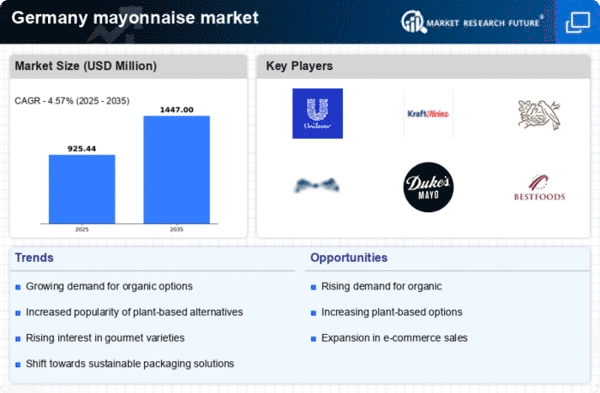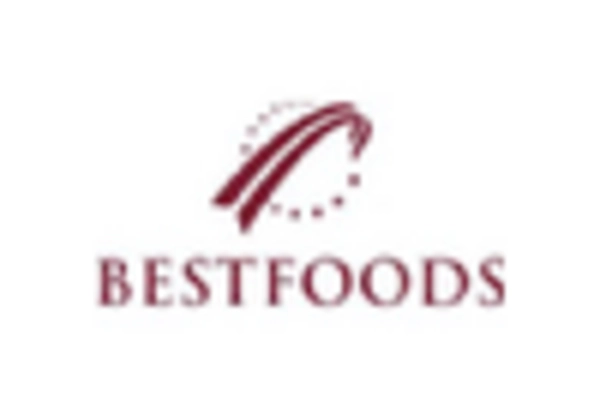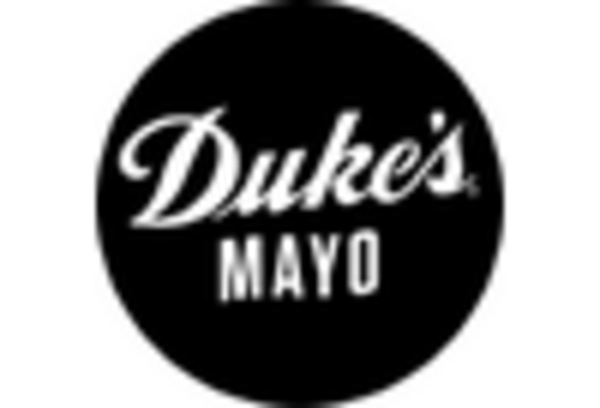Expansion of Food Service Sector
The food service sector in Germany plays a crucial role in driving the mayonnaise market. With the increasing number of restaurants, cafes, and catering services, the demand for mayonnaise as a condiment and ingredient is on the rise. Recent data indicates that the food service industry has grown by approximately 10% over the past year, contributing significantly to mayonnaise consumption. This growth is particularly evident in fast-casual dining establishments, where mayonnaise-based sauces are popular among consumers. The mayonnaise market is capitalizing on this trend by developing bulk packaging options and tailored products for food service operators. As the food service sector continues to expand, it is likely that mayonnaise will remain a staple ingredient, further boosting market growth.
Innovations in Packaging Solutions
Innovative packaging solutions are emerging as a key driver in the mayonnaise market in Germany. As consumer preferences evolve, manufacturers are exploring new packaging formats that enhance convenience and sustainability. For instance, the introduction of squeeze bottles and eco-friendly materials has gained traction among environmentally conscious consumers. Recent surveys indicate that approximately 25% of consumers are willing to pay a premium for sustainable packaging. This trend encourages brands to invest in research and development to create packaging that not only preserves product quality but also aligns with consumer values. The mayonnaise market is likely to see continued innovation in packaging, which could lead to increased market share for brands that successfully meet these consumer demands.
Rising Demand for Gourmet Products
The mayonnaise market in Germany experiences a notable shift towards gourmet and artisanal products. Consumers increasingly seek high-quality, unique flavors that differentiate from traditional offerings. This trend is reflected in the growing sales of premium mayonnaise, which has seen an increase of approximately 15% in the last year alone. The demand for organic and locally sourced ingredients further fuels this growth, as consumers become more discerning about their food choices. The mayonnaise market is adapting by introducing innovative flavors and packaging that appeal to gourmet enthusiasts. This shift not only enhances consumer experience but also allows brands to command higher prices, thereby increasing overall market revenue. As the trend continues, it is likely that more manufacturers will invest in developing gourmet lines to capture this lucrative segment.
Increased Focus on Clean Label Products
In recent years, the mayonnaise market in Germany has witnessed a significant movement towards clean label products. Consumers are increasingly concerned about the ingredients in their food, leading to a demand for transparency and simplicity in product formulations. This trend is evidenced by a rise in sales of mayonnaise products that boast natural ingredients and no artificial additives. Approximately 30% of consumers now prefer products labeled as 'clean' or 'natural', prompting manufacturers to reformulate their offerings. The mayonnaise market is responding by highlighting ingredient sourcing and production methods, which not only meets consumer expectations but also builds brand loyalty. This focus on clean labels is expected to continue shaping product development strategies, as companies strive to align with consumer values and preferences.
Growing Popularity of International Cuisines
The growing popularity of international cuisines in Germany is significantly influencing the mayonnaise market. As consumers become more adventurous in their culinary choices, they are increasingly incorporating mayonnaise into diverse dishes inspired by global flavors. This trend is particularly evident in the rise of fusion cuisine, where traditional mayonnaise is used in innovative ways, such as in Asian-inspired sauces or Mediterranean dips. Market analysis suggests that this shift has led to a 20% increase in mayonnaise sales within the food retail sector. The mayonnaise market is responding by diversifying product offerings to include flavors that cater to these international tastes. As the trend continues, it is likely that mayonnaise will solidify its position as a versatile ingredient in various culinary applications.
















